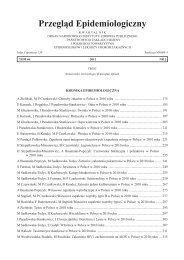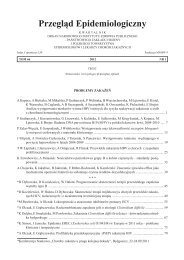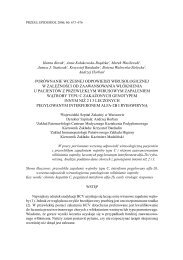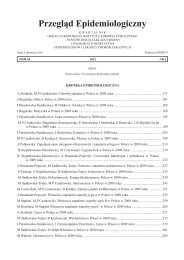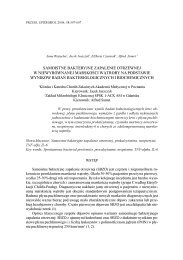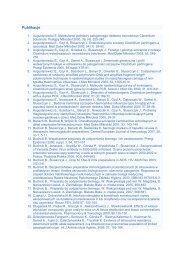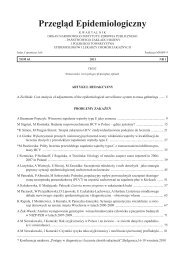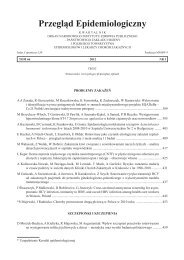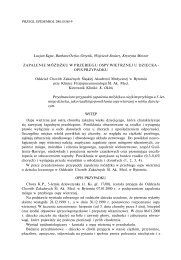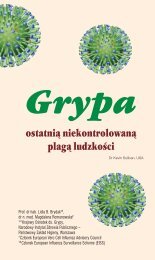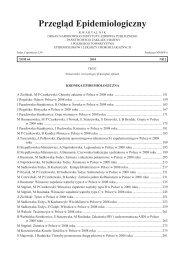Przegląd Epidemiologiczny - Państwowy Zakład Higieny
Przegląd Epidemiologiczny - Państwowy Zakład Higieny
Przegląd Epidemiologiczny - Państwowy Zakład Higieny
Create successful ePaper yourself
Turn your PDF publications into a flip-book with our unique Google optimized e-Paper software.
PRZEGL EPIDEMIOL 2010; 64: 479 - 484 Problemy zakażeń<br />
Paulina Godzik, Marcin Komorowski, Joanna Cielecka-Kuszyk, Kazimierz Madaliński<br />
InHIBItorY WIrUSA ZAPALEnIA WĄtroBY tYPU C – moŻLIWoŚCI<br />
tErAPEUtYCZnE<br />
INHIBITORS OF HEPATITIS C VIRUS - THERAPEUTIC POSSIBILITIES<br />
Pracownia Immunopatologii Zakażeń Wirusami Hepatotropowymi Zakładu Wirusologii,<br />
Narodoweg Instytutu Zdrowia Publicznego – Państwowego Zakładu <strong>Higieny</strong>, Warszawa<br />
STRESZCZENIE<br />
Poszukiwania nowych leków przeciw HCV idą<br />
w kierunku opracowania preparatów, które hamują<br />
translację lub blokują białka wirusowe, a nawet białka<br />
gospodarza uczestniczące w patogenezie zapalenia<br />
wywołanego przez HCV. Taką grupą związków są inhibitory<br />
proteazy serynowej NS3 (telaprevir, boceprevir,<br />
R7227, TMC435, SCH900518, GS9256). Najbardziej<br />
zaawansowane badania dotyczą telapreviru i bocepreviru;<br />
obecnie testuje się ich działanie w terapii kombinowanej<br />
z PegIFN-a i RBV, które weszły już w III fazę<br />
badań klinicznych (osiągnięto wysoką trwałą odpowiedź<br />
wirusologiczną (SVR) na poziomie 60-75%). Do tej<br />
grupy należą także inhibitory domeny NS5A, w tym<br />
PPI-461, który wykazuje aktywność przeciwwirusową<br />
i cytotoksyczną. Kolejnym rodzajem proleków są inhibitory<br />
helikazy NS3, np. peptyd p14 (IC50 = 725 nM).<br />
Trwają prace nad inhibitorami wnikania wirusa<br />
(ITX-5061), szczepionkami terapeutycznymi (IC-41,<br />
Civacir, TG-4040, CT-1011, GI-5005) oraz preparatami<br />
immunomodulującymi (ANA-773, IMO-3649, NOV-<br />
205) (17). Lekami działającymi na białka gospodarza są<br />
m.in. inhibitory cyklofiliny. Najbardziej zaawansowane<br />
badania dotyczą preparatu DEBIO 025, z którym po<br />
zakończeniu badań I i II fazy, III fazę badań klinicznych<br />
rozpoczęto w lutym 2010.<br />
Od 5 lat istnieje możliwość badania efektów tych<br />
związków w warunkach in vitro z zastosowaniem linii<br />
komórkowej Huh-7 zakażonej HCV. Studia te pozwalają<br />
na ocenę efektywności i cytotoksyczności związków, a<br />
także oporności szczepów wirusa.<br />
Słowa kluczowe: inhibitory wirusa zapalenia wątroby<br />
typu C, terapia przeciwwirusowa, interferon α, swoiste<br />
antywirusowe terapie HCV<br />
ABSTRACT<br />
The search for new drugs against HCV contains new<br />
ways to obtain pro-drugs which inhibit translation and<br />
block viral proteins, and inhibit host proteins important<br />
in HCV-induced pathogenesis. This group of agents are<br />
serine protease NS3 inhibitors (telaprevir, boceprevir,<br />
R-7227, TMC-435, SCH 900518, GS-9256). The most<br />
advanced studies are developed with telaprevir and<br />
boceprevir; at present their effect in combined therapy<br />
with PegIFN-α and RBV in the III clinical phase is<br />
tested. The sustained viral response (SVR) was achieved<br />
at the level of 60-75%. This group of agents contains<br />
also inhibitors of NS5A domain, e.g. PPI-461 which<br />
shows antiviral and cytotoxic activity. The following<br />
prodrugs are NS3 helicase inhibitors, e.g. p14 peptide,<br />
whose IC50 equals 725nM.<br />
Studies are continued on viral entry inhibitors (ITX-<br />
5061), therapeutic vaccines (IC-41, civaci, TG-4040,<br />
CT-1011, GI-5005) and immunomodulating preparations<br />
(ANA-773, IMO-3649, NOV-205). The agents<br />
acting on host proteins are a.o. cyclophilin inhibitors.<br />
The most advanced studies concern DEBIO 025 preparation<br />
which after phase I and II, underwent phase III<br />
of clinical studies in February 2010.<br />
Since 5 years there is a possibility to investigate the<br />
effects of these comounds in vitro with the use of Huh-7<br />
line infected with HCV. These invenstigations allow to<br />
estimate the antiviral effectiveness and cytotoxicity of<br />
agents, and resistance of viral strains.<br />
Key words: Inhibitors of hepatitis C virus, antiviral<br />
therapy, interferon α, specifically targeted antiviral<br />
therapies for HCV (STAT-C)



